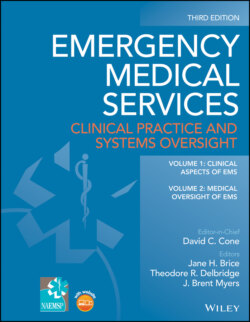Читать книгу Emergency Medical Services - Группа авторов - Страница 360
Presentations, etiologies, and treatments
ОглавлениеThe potential presentations and causes of AMS are extensive and complex. Although the definitive treatment for many of these problems may fall outside the scope of practice of EMS clinicians or the duration of the prehospital contact, the focus should be on identifying the primary cause or causes of AMS and beginning specific treatment in the field. As causes of AMS are identified in the individual patient, it is also necessary to determine whether a brief on‐scene interval and expeditious transport are required for time‐critical causes (e.g., STEMI, stroke, trauma), or whether the patient would benefit from further extended on‐scene management. A simple and frequently used mnemonic for the potential causes of AMS is AEIOU TIPPS (Box 15.1)
A major challenge with AMS patients is that they can be easily triaged into the AMS “not otherwise specified” protocol, while instead having a definable process. Dysrhythmia or hypotension associated with inferior MI may present with AMS as the predominant sign, and stroke patients with aphasia may be classified first as AMS. Indeed, all the various classes of shock may present with AMS yet may require different treatments.
Furthermore, patients with AMS may have multiple comorbidities that could be identified in the prehospital environment. For example, it is tempting to assume that a patient with seizures, who may be actively seizing or postictal, has an underlying seizure disorder. However, seizures may be caused by cardiac arrest (ventricular fibrillation), hypoxia, hypoglycemia, trauma, intracranial hemorrhage, stroke, infection, or drug overdose or withdrawal, all etiologies that can separately contribute to the patient’s AMS.
AMS patients with any of multiple etiologies may also be physically aggressive or combative, presenting a challenge as well as a risk to EMS clinicians. Patients with traumatic head injuries, those under the influence of either prescription or illicit drugs or alcohol, and those with medical emergencies such as hypoglycemia, postictal state, decompensated psychiatric disorders, and many others may be violent. The experienced EMS clinician will recognize that such a patient may have combative AMS due to an underlying medical condition, but that does not lessen the risks of physical harm to the patient or the clinician. Care should be taken to ensure both crew and patient safety. For additional information on managing the combative patient, refer to Chapter 58.
